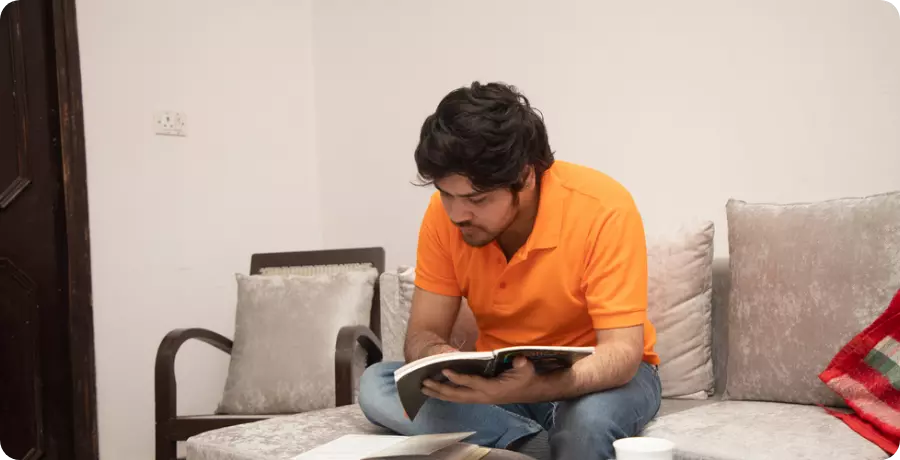Everything You Need to Know About Studying Ph.D. in Denmark
Sulekha Study Abroad: From Expert Guidance to Global Opportunities.
- Comprehensive Guidance: Expert advice on universities, courses, and scholarships.
- Top Destinations: Insights into renowned study-abroad countries.
- Up-to-date data: Information on foreign entrance exams, deadlines & accreditation.
- Personal Growth: Cultural immersion, independence, and global perspective.
- Enhanced Support: NEHA Chatbot for instant answers and guidance.
- Expert Consultation: Personalized advice from verified professionals.
Admission Requirements and Application Process in Denmark
Deciding to pursue Ph.D. is a big step in itself. The road to submitting has prerequisites to follow. It can make the application procedure easy. The admission requirements vary from one institute to another. The main criterion is a recognized master’s degree in a subject where an aspirant wants to pursue their Ph.D. program.
If an aspirant wants to study abroad, they should have proficiency in the English language. A student can also start the research program after completing a bachelor’s degree. It is the 3+5 program, meaning pursuing the master's and Ph.D. simultaneously. An aspirant can also go for the 4+4 program. It means starting the Ph.D. degree one year after the master’s program. These two study programs are available at the University of Copenhagen under the Faculty of Science.
The application for a Ph.D. program should include writing about projects and scholarships. An aspirant can suggest or apply their research ideas with pre-decided research subjects. In addition, students need to add a transcript of their grades for the bachelor's and master's degrees with correct certificates and a CV.
Choosing the Research Area
The primary deciding factor of a Ph.D. study program is its research area. Be it an Arts or Humanities subject, there is a vast scope of research for an individual subject. Though most courses expect students to have a relevant degree in research, previous qualification is not always important. The area of research has to be similar, and the topic should relate to experience.
Kind of Ph.D. Work
It can be Ph.D. on self-proposed or predesigned projects, and it is one’s preference to choose the way. PhDs in arts and humanities stream are self-proposed. The advertised projects are available in different forms:
• iCASE
• Doctoral Training Partnership or DTP
• Centre for Doctoral Training or CDT
The difference in these is the level of industry experience a student gets – DTPs have the least, with iCASEs having the highest degree. These projects are a four-year course program. Many aspirants wish to design their projects for the Ph.D. study program. It becomes rewarding as students already have good knowledge of the work extant. Not all self-proposal projects get funding, though there are several funding options in Ph.D. study programs. A student needs to design the project with proper research. Students choosing this path have to research and draft a proposal for the same.
Contacting Supervisors
Once the aspirant decides the project to apply to the study program, it's time to look for prospective supervisors for guidance. It can help gain insight into the course, taking it to the next level. Aspirants must choose supervisors from the advising list, contact them and discuss the research. When a student proposes their Ph.D. research, they have to look for an expert supervisor to get good feedback for the work.
Check the Entry Requirements
It’s important to check the entry requirements of the project or the institute. Applicants must have a master’s degree and good scores in the research subject.
Pursuing Ph.D. without Masters
Some funding grants will allow graduates to take the study program. Here, students can go for integrated programs in which a student should have masters level training for suitable Ph.D. research.
Criteria for International Applicants
Students need a student route visa to study in Denmark. A student must furnish a confirmation document from the university, proof of adequate funds, and proficiency in English. The language test and the entry tests are vital to check.
Check Fees and Funding Options
After knowing the course and clearing the eligibility, it's time to look for funding options. If an advertised project is successful, students can receive full funding. It comes from Research councils, and there are restrictions to use the money, along with a deadline for the thesis. Knowing the funder's option can help students arrange the necessary amount. Only a definite amount is available for the self-proposal projects, and not all students can get funding assistance.
Get Ready to Apply
Be careful to take time and check the difficulties before the deadline. Also, the student should check the document list to submit with the application, and the university can ask for the following:
- Research proposal
- CV
- Personal statement or a cover letter
- Details of two reference persons
- An academic transcript
Submit the Application
It is time to apply through the university’s application portal to study in Denmark. If asking for funding, an aspirant should go through the funder’s website. Grant from Research Council goes with the same application, whereas the system can be different for other funders.
Availability of Scholarships and Grants for Ph.D. Students in Denmark
Getting a full fund for a scholarship can be challenging, it's better to know the available funding options.
- Universities can offer funds, from small discounts to full studentships. It depends on the university and the study program.
- Independent organizations like trusts and charities offer partial funding when research relates to the groups’ interests.
- Students can look for Ph.D. loans, in partial, from the government. Taking a part-time job is a suitable choice for self-funding study programs
Other Popular Scholarships in Denmark Universities are:
- Spreadsheet Gladiator Scholarship:It is for a student who wishes to enter business and can get annual assistance of $1,500
- Lincoln University Doctoral Scholarships: The new students who wish to pursue Ph.D. or research studies at Lincoln University.
- Edward Stewart Scholarship in Scottish Studies:The eligibility depends on a high academic score without needing any application.
- Dorothy Britton Memorial Doctoral Scholarship:It considers a student’s academic achievement to grant the scholarship.
Ph.D. Structure: Coursework, Research, and Thesis in Denmark
Ph.D. is three years, a full-time program where an aspirant takes independent research subjects. They can take courses up to 30 ECTS credits. The program ends in Ph.D. that documents that research output.
Coursework:
An aspirant should participate in course activities for up to 30 ECTS credits during the study program. It is a six-month full-time study program from the University of Copenhagen or others. Here, conference attendance also counts as an activity.
Research:
Students should start searching from previous degrees to gain better insight into the research subject. The more familiar they are with the academic argument, the better their discussion can be, applying the right theory. Look for the correct source and derive the information for the research.
The research follows with the drafting of a proposal. It isn’t the final piece to submit with the application, but it helps get a prospective supervisor.
Thesis:
It should be original and of a high standard. Its specific requirement depends on the subject and its research field. Once the studies for the programs are approved, an aspirant can move forward with the thesis for assessment.
Danish Universities and Research Institutions Renowned for Ph.D. Studies
As per the Academic Ranking of World Universities, the top 7 university of Denmark includes Aalborg University, Technical University of Denmark and Roskilde University. It mainly focuses on the number of scientist awards, contributions to the scientific community, and the academic experts from a university. Other top Denmark universities are:
1. Aarhus University
2. University of Copenhagen
3. University of Southern Denmark
4. Copenhagen Business School (CBS)
Living and working in Denmark as a Ph.D. student
The cost of accommodation is high than in other European countries, where rent includes the cost of utilities. There are not enough accommodation options. So, aspirants should search for housing help from the international office.
A student has to pay around €875 to €1230 monthly, with € 400 to 670 for accommodation and € 200 to 270 for food. An international student. After completing a Ph.D., they can take up a job with one day's notice if they have a work or residence permit.
When students have enough funding for their research program, they must look for grants or part-time jobs to fund their study programs. The student’s salary will be per the Danish Confederation of Professional Associations and the Ministry of Finance agreement for funding research. The average pay at the University of Copenhagen is 32567 DKK. There are employment contracts with universities under Industrial Ph.D., where students can get employment scope from a partner or the university.
Recently Added Study Abroad Blogs
- Engineering Marvel: Unleashing the Engineer in Denmark
- University of Pennsylvania: Ranking, Courses, Admission, Fees, Scholarship & Placements
- Building a Successful Career- Job Opportunities in New Zealand
- ESMT Berlin: Ranking, Courses, Admission, Fees, Scholarship & Placements
- Taking Up Post-Graduation Programs in The UK: What You Need To Know
- Chalmers University of Technology: Ranking, Courses, Admission, Fees, Scholarship and Placements
- Esslingen University of Applied Sciences: Ranking, Courses, Admission, Fees, Scholarship and Placements
- Unlock Your Engineering Dreams: Top US Universities With Scholarships For Masters
-
Monika Answered on 20/12/2023
Studying MBBS in the USA can cost between $30,000 and $60,000 per year, which doesn't include additional expenses like living costs and health insurance. For instance, renowned institutions in urban areas may have higher fees than universities in suburban or rural settings. In addition to tuition, Indian students need to consider other essential costs.
The approximate cost of living in the USA varies: housing ($1,000 to $2,500/month), food ($300 to $500/month), transportation ($70 to $120/month for public transit), utilities ($150 to $250/month), healthcare (a few hundred dollars/month), and miscellaneous expenses ($200 to $400/month).While the upfront costs can seem substantial, prospective students should explore financial aid opportunities, scholarships, and grants.
Many universities and private organizations in the USA provide financial assistance to international students based on merit or need. This financial support can significantly alleviate the overall cost of pursuing a medical degree. Researching specific universities is crucial to obtaining accurate and up-to-date information on fees and available financial aid.
Students should consider the overall environment, quality of education, and potential for research or clinical experience when selecting a university in the USA for their MBBS program. Connect with Sulekha Study Abroad Experts now!Read More(2)(0)Have questions about studying abroad? Ask NEHA, your study abroad companion!
Top Study Abroad Consultants
-
I
Services: Study Abroad
About:We are a leading overseas education consultancy, p Read moreWe are a leading overseas education consultancy, providing a one-stop solution for aspiring students like you and all partner institutions. Our goal is to make your whole study abroad process easy and free of hassles and towards this end, we provide our services to students free of cost. we provide professional career counselling/consulting services to students in India who would like to pursue further education abroad in countries like Canada, New Zealand, USA, Australia and the UK. We help you
Review: ndjdjene shrines skndjdbebs d
-
A
Services: Study Abroad,Visa consultants
About:Arise Visa Consultants is leading student visa con Read moreArise Visa Consultants is leading student visa consultancy in North India. Our goal is to support every learner, every learning professional, education institutes and recruitment organizations through our work. Arise Visa Consultants has tried to dispel the myths associated with abroad studies and internships by simplifying the procedures through technology resourcing and knowledge consulting with institutions and agencies alike. Till date many students have successfully gone to different countr
-
F
Services: Study Abroad,Immigration consultants,Visa consultants,US Visa consultants
About:Welcome to Focus Immigration Services, where we he Read moreWelcome to Focus Immigration Services, where we help students and professionals reach their dreams of studying and working abroad. Our team of experienced and knowledgeable visa and immigration consultants provide assistance in all aspects of the process, from choosing the right program to securing a visa. We specialize in overseas education and offer services for various countries, including the USA, UK, Australia, Canada, New Zealand, and Singapore. Our expertise also covers a wide range of fi
-
B
Services: Study Abroad,Visa consultants
About:Blue hills immigration is one of the trusted immig Read moreBlue hills immigration is one of the trusted immigration Consultants having years of experience in offering high-quality solutions in visa processing. we have a large list of successful and satisfied clients. at blue hills immigration, we provide assistance in securing family visas, business visas, dependent visas student visas, etc. we believe in providing world-class services to our clients our skilled professional and expert immigration counselors are the faces of our organization. we provide
Review: Nice service all people are helpful good dealing
-
M
Services: Study Abroad,Visa consultants
About:With years of dedicated service in the field of ov Read moreWith years of dedicated service in the field of overseas education and visa consulting, Mastermind Immigration has become a reputable and trusted name in the industry. Our extensive experience has equipped us with the knowledge and expertise necessary to assist our clients in achieving their dreams of studying abroad or obtaining the necessary visas to travel or relocate overseas. Business Type: Overseas Education, Visa Consultants About Us: At Mastermind Immigration, we are committed to helping
-
A
Services: Study Abroad,Visa consultants
About:We are an overseas education consultant company lo Read moreWe are an overseas education consultant company located in Chandigarh with an aim of helping our clients in completing their higher studies from reputed countries known for their high quality of education like Australia, Canada, Europe, New Zealand, UK and USA. We assist students to make the right choice with regards to pursuing education in overseas educational institutions. We provide the right guidance to students so that they choose the best course and institution suited to their needs and h
Review: Jasmeet this side, I applied my visa through Aster consultants and my profile was complicated due to my academic gap and wide work experience but with the help of Aster I am flying to Canada in some days. So thankful and highly recommend Aster to everyone, just go through their counselling once no falls promises, answer calls on time and always provide the right information.
-
F
Services: Study Abroad,Finance certification tuitions,Professional accounting tuitions,CFA tuitions
About:FPA - Financial Planning Academy is a tech-driven Read moreFPA - Financial Planning Academy is a tech-driven educational training academy that has tremendous core expertise in transforming careers and making our learners achieve their globally desired outcomes. Our key areas of coaching are accounting, management, strategy, analytics, and finance. Get Trained for ACCA, CPA US, CFP CMA & CFA.
Review: Good Communication 5/5 responsiveness 5/5 good price 5/5 ontime services 5/5 Service Quality 5/5
-
I
Services: Study Abroad
About:The mission of the Institute is to offer world-cla Read moreThe mission of the Institute is to offer world-class, innovative, career-oriented professional post graduate and undergraduate programmes through inclusive technology-aided pedagogies to equip students with the requisite professional and life skills as well as social sensitivity and high sense of ethics. The Institute will strive to create an intellectually stimulating environment for research, particularly in areas that have a bearing on the socio-economic and cultural development of the state
-
P
Services: Study Abroad
About:Petals International, established in 2012, has mas Read morePetals International, established in 2012, has massive experience in offering overseas education services for students in Delhi and NCR. We offer overseas education services to countries like UK, Dubai, Mauritius, Malaysia, Ukraine, Singapore, Cyprus, etc. Our certified trainers guide the students through the entire process of applying to universities for their higher education. We help students choose the university that meets their academic and financial needs. We also offer visa applications,
-
S
Services: Study Abroad,Visa consultants
About:Se International Immigration Company deals in stud Read moreSe International Immigration Company deals in study visa for Australia, Canada, USA & Europe. We counsel the students aspiring to study abroad in best way possible. We also provide tourist visa for countries like Schengen Countries, Canada, Australia, USA, Singapore, etc. Welcome to SE International Immigration Consultant Pvt. Ltd., your dedicated partner in shaping dreams and facilitating global opportunities. With a noteworthy experience of 2 years, SE International stands a
Review: Great and genuine service so much satisfied with their consultation, trust them once to make your dreams come true
-
A
Services: Study Abroad,Visa consultants
About:"We are Punjab Government Approved (License Read more"We are Punjab Government Approved (License No. 1407) overseas education consultant company providing assistance to study in Canada, Australia, UK, USA, Germany."
Review: I have visited Aster Consultants Ludhiana only once and have had the chance to meet Akshit sir and I will like to share here that all my queries were properly addressed and I am really looking forward to my study visa application process with Team Aster. I will also like to suggest everyone who is looking for Study Visa, Visitor Visa or Spouse Visa to visit them once and get their process completed through them.
-
S
Services: Study Abroad,Immigration consultants,Visa consultants,Foreign education entrance exam coaching
About:Embark on your international aspirations with conf Read moreEmbark on your international aspirations with confidence. We navigate the complexities of immigration, education, career, and travel your one-stop shop for global success

.webp)










.png)